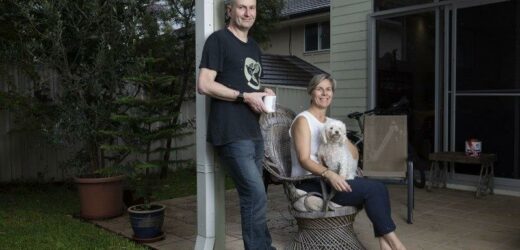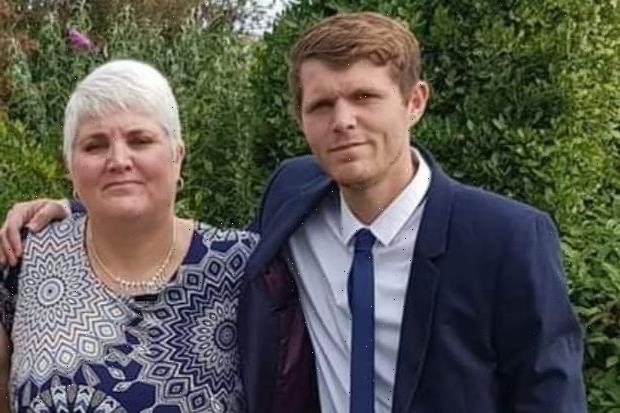Talking points
- The Bank of Mum and Dad has become one of the top mortgage lenders in the country
- Some homeowners would prefer to see prices moderate for the chance their children might own a home sooner and without their financial help
- “It’s not really liberating to have these prices go up, it’s more a constraint.” – homeowner Jessica Stewart
Property listings
John Howard famously said he had never met anyone who complained about their house going up in value, but there are some homeowners who might beg to differ.
With house prices spiralling in the past two years, the Bank of Mum and Dad has become one of the top mortgage lenders in the country.
Jessica Stewart and her husband Chris Gentle at their Gladesville home in Sydney’s inner west. They believe that spiralling property prices are not good for them or their three children. Credit:Jessica Hromas
But there are plenty of mums and dads who do not want to run a bank, and many who wish their house had not shot up in value because it locks their children out of the market and risks their retirement when raiding their nest-egg to help their offspring.
Sydney homeowner Jessica Stewart and husband Chris Gentle, who are concerned about the property market’s unprecedented growth and what it means for their three children, would rather house prices slowed down.
The couple bought their first property in Camperdown in the 1990s, upgraded to a house in Gladesville in the noughties and then renovated.
It is a far cry from what their children will be able to do, Stewart says, not just in these areas but anywhere in Sydney.
With home-owning voters far outnumbering would-be home-owning voters, housing policy transformation can be politically difficult.Credit:Peter Rae
“I truly don’t see that being a reality that will be easy for them,” she said, “the idea of them having the life we lived in Sydney.”
Sydney’s record price growth since the pandemic hit has seen house prices surge more than 55 per cent in less than three years, with the typical house now costing almost $570,000 more than it did in early 2019, Domain data shows.
”It really will hurt people who don’t have the same opportunities,” Stewart says. “It certainly comes with a price, it’s an inability for our kids to do what we did.”
The 52-year-old said the capital growth was unrealised unless they sold their family home to help their children, which would risk their retirement if they were locked out of the Sydney market and unable to buy back in.
“It’s not really liberating to have these prices go up, it’s more a constraint,” she says.
“Exponentially increasing property prices doesn’t do anything for us now – everybody needs a place to live, we are not about to cash in this, we need a roof over our heads.
“I would be quite happy with that [prices moderating], we don’t need that much wealth in our property.
Governments have failed to supply enough properties to meet demand, according to AMP Capital’s chief economist Shane Oliver.Credit:Wolter Peeters
“It’s kind of a no-brainer, it really is shooting ourselves in the foot to think that this increase in property prices won’t hurt future generations.”
It is a similar story in Melbourne, where house prices have jumped 35 per cent in the less than three years since their last substantial downturn, despite six lockdowns.
This record growth worries Carlton homeowner Katie Roberts-Hull, even though she was “lucky” enough to buy a property with her partner in late 2019.
“It’s such a massive investment you can see why people are like ‘Of course I want property prices to go up, I’m investing in this and don’t want to lose money on it’,” Roberts-Hull says.
Katie Roberts-Hull is concerned about the current property boom and is happy for prices to slow down as it would allow her family to invest in pursuits beyond property. Credit:Wayne Taylor
But she feels the opposite way for a range of reasons, including a secure future for herself, her two children and the local community, as many of her friends and shop owners are priced out of the neighbourhood.
“Everybody is building wealth individually, but the community is losing what makes it valuable,” she says, adding that she would support any measure “to keep prices down”, including the construction of more homes and increased density to allow more people, including her children, into the property market.
“I’m lucky that I’m generating wealth but all of my mental and financial energy, everything excess, is potentially going to our property instead of other things we want to do with our lives,” she says.
“It’s a weird world to live in when all of your money is in this house you’re living [in] and when you die millions of dollars are being inherited, so it’s not being used in a productive way in society.”
The 36-year-old, who works in education policy, said it would be healthier for homeowners to invest this capital into pursuits other than housing.
“What I worry about [for my children] is they feel it’s the main goal in life, instead of their careers or what experiences they have. They may have to sacrifice all of that to get into the property market.”
Dwelling values across the country have almost tripled in the past two decades. Credit:Eddie Jim
Rising property prices, especially the rate of growth seen in the past few years, only benefit investors, according to Matt Grudnoff, senior economist at the Australia Institute.
“Owner-occupiers don’t really benefit much from higher prices. This is because, while they get more for their house when they sell it, they then have to buy another house which has also gone up in price,” Grudnoff says. “Buying a house from someone and then selling it to someone else at a higher price has no wider economic benefits.”
He says if house prices instead grew at a slower rate, owner-occupiers would not miss out and first-home buyers could get in more easily without having to rely on parental generosity, a feature that was increasing inequality in Australian society.
“During the Howard years we had, from an economist’s point of view, a really weird discussion about low interest rates being a good thing. This might sound counterintuitive, but lower interest rates don’t make housing more affordable,” Grudnoff says, adding these would only make mortgage repayments lower for existing homeowners.
Low interest rates have increased the amount people can borrow and spend on property, driving up prices in turn, he says. “There are only two ways to make housing more affordable: You either increase supply or you decrease demand.”
Removing tax incentives for investment properties is one way to reduce demand, Grudnoff says.
Politicians need to find the political will and capital to steer away from Australians’ obsession with housing, AMP Capital’s chief economist Shane Oliver says.
“Price rises and growth in the economy is generally a good thing but if you get too much of it, it can be overheated, unaffordable and socially divisive,” Oliver says.
“You really need to educate the population and promote the argument of why we want to slow down the property market, but it relies on politicians arguing why it should be the case.
“If it is portrayed as a change over many years, like economic reforms in the ’80s, Australians would understand it. It’s a hard slog on politicians, and they prefer focus groups and whatever focus groups say.”
Ultimately, all three levels of government need to coordinate their efforts to seriously address the “massive disconnect” between price growth and wages growth, Oliver says.
“It’s a long-term problem for Australian society. We need to address this seriously, and I am a Baby Boomer who has benefited from this. It’s inconsistent with the Aussie Dream and the things that made Australia great.”
Most Viewed in Property
Source: Read Full Article







